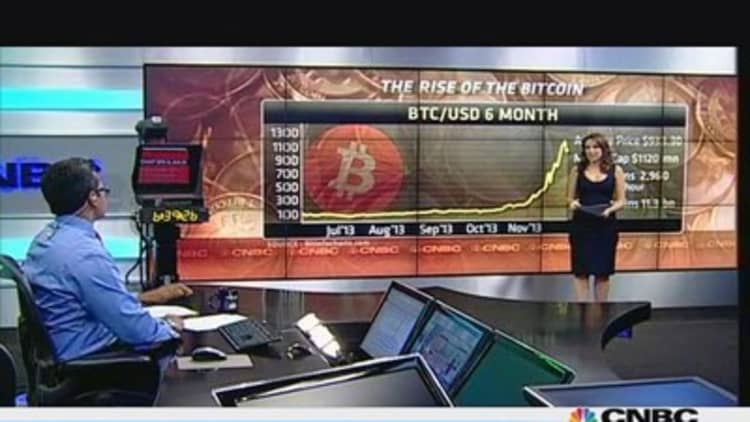In the past year, cryptocurrencies such as bitcoin have soared in popularity, suffered a clamp down from economic powerhouse China and grabbed the attention of the likes of billionaire entrepreneur Richard Branson.
"Virtual currencies, perhaps most notably bitcoin, have captured the imagination of some, struck fear among others and confused the heck out of the rest of us," U.S. Senator Thomas R. Carper, chairman of the Senate Homeland Security and Governmental Affairs Committee, said last month.
Here are five things that might help make sense of the new world of digital currencies.
1) What exactly is bitcoin? Referred to as a "virtual" currency, bitcoin allows users to exchange online credits for goods and services. According to website bitcoin.org, bitcoin is "nothing more than a mobile app or computer program that provides a personal bitcoin wallet and allows a user to send and receive bitcoins with them." Some 12 million bitcoins are believed to be in circulation. Bitcoin has risen 5,171 percent this year and is currently around $700, although its value is down nearly 44 percent from a record high of around $1,242 hit on the Mt Gox exchange in late November.
(Read more: Bitcoin price halves as China clampdown escalates)
2) They're not really currencies - Bitcoin and peers litecoin and peercoin, among others, are not legal tender anywhere in the world, raising some questions as to whether they can really be called currencies. And unlike the U.S. dollar, Japanese yen or the for instance, digital currencies are not controlled by a central bank and their value can fluctuate wildly. To its creators and disciples, bitcoin is more of an ideological project that embodies a philosophy, rather than about finance.

"It's very much still an experimental currency and it should be considered a high-risk environment for consumers and investors at the moment," Patrick Murck, general counsel for the Bitcoin Foundation, a nonprofit group, told a U.S. Senate hearing in November.
(Read more: Meet 'Bitcoin Jesus,' a virtual currency millionaire)
3) Government warnings - A number of governments have expressed their concern about the use of virtual currencies
Earlier this year, Thailand declared the currency illegal due to a lack of applicable laws. Norwegian authorities said this month that the country won't recognize bitcoins as legal tender. The country considers bitcoin an asset which should be subject to capital gains tax.
However, U.S. authorities are still trying to figure out what stance to take on bitcoin. Opinions were mixed at a congressional hearing on virtual currencies in November, though some authorities claimed to see the benefits that bitcoin presented.
Reports this month that China has ordered third-party payment providers to stop using bitcoin dealt the virtual currency a further blow.
(Read more: Buyer beware: Bitcoin's fate could rest with China)

4) Growing popularity - Despite the clampdown in some parts of the world, analysts say there's no turning the clock back on digital currencies. A university in Cyprus, a sustainable grocer, a travel website, a delicatessen and a guitar repair shop are just some of the businesses that have received attention online with their decisions to accept bitcoins as payment. Billionaire entrepreneur Richard Branson told CNBC in November that his commercial space flight venture will accept bitcoin as payment. He described bitcoin as "a new exciting currency." Web-based searches for the term 'bitcoin,' which was added to Oxford Dictionaries Online this year, meanwhile have seen a sharp increase since September according to Google data.
"I am fine with the risks, I mean sure it would be nice that it goes to legal status smoothly but regardless, I think the movement would survive and thrive on its own," Sunny King, architect of peercoin, told CNBC earlier this month.
(Read more: Bitcoin – the world's best boost to a brand?)
5) Credible investment? - The Winklevoss brothers think so. Cameron and Tyler Winklevoss, well known for battling Mark Zuckerberg over the origins of Facebook, are big investors in bitcoin and want to create a bitcoin Exchange Traded Fund (ETF) that is accessible to all investors. Also, JP Morgan, the world's largest investment bank, has taken a step towards creating a bitcoin-style currency of its own, filing a lengthy patent for an electronic currency.
"Investors are starting to opt for alternative investments such as bitcoin amid concerns that traditional investments such as the housing market are becoming increasingly risky," Kyle Drake, founder of CoinPunk, an open source hybrid web wallet, said on the sidelines of a bitcoin conference in Singapore in November.
— By CNBC.Com's Dhara Ranasinghe; Follow her on Twitter @DharaCNBC


